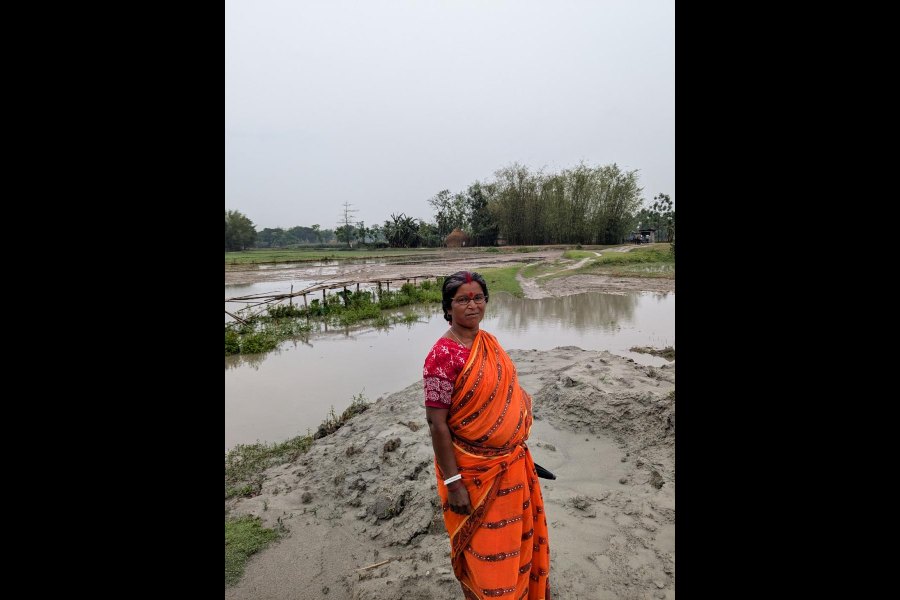Boalmari is a char or riverine island in the floodplains of the Teesta. The name suggests that once upon a time, fisherfolk here would routinely get rich hauls of boal, a kind of freshwater fish known for its delicate flavour. That was in the late 1940s.
Though only 50 kilometres from Jalpaiguri town in north Bengal, Boalmari is not easy to access.
You have to take a Mekhligunj-bound bus from Jalpaiguri, get off at Bhotpatti, board a crowded “magic van” and reach Helapakri Bazar. From there, a Toto will drop you off at Padamati village. Then you have to walk past bamboo groves
and fields of groundnut, potato and corn, and negotiate countless creeks and rivulets.
For miles around us there are stretches of sand and alluvial soil and makeshift bamboo bridges. You have to cross fields heavy with watermelon and cucumber crops until you reach the oasis called Nandanpur village in the heart of Boalmari. If you see a satellite image, you will realise that Boalmari is part of an extensive char called Nijtaraf.
It is afternoon by the time we reach the island. We, meaning myself and 20 geographers, professors, scholars and researchers from various universities, led by geographer Mehebub Sahana of the UK’s Manchester University and Alladi Roy, 55, who is our local guide.
Alladi’s primary identity is that she owns and runs the biggest shop on the char. It was late spring when we visited; the river was slowly drying up. As we kept walking, Alladi said, “This sand bed used to be our homestead 20 years ago. The river has been eating up 100 to 150 bighas of our village every year of the past decade.” One bigha equals 0.62 acres. Every monsoon the area gets inundated and the land eroded.
Alladi was not born here, her husband Ganesh Roy was. The couple could not make ends meet. There was the NREGA but wages were not enough for their large family, which included three children and a widowed sister-in-law and her children. It did not take Alladi long to figure out that farming wasn’t a viable option either, given that Boalmari was perennially at the mercy of the Teesta. So, she decided to try her hand at entrepreneurship.
There was no grocery shop in the village, so she started one. She says, “My husband sourced the goods from Helapakri, while I ran the shop alongside taking care of the children.” Within a month she had a good number of customers. Now she began to expand her business. From spices to vegetables, petrol to diesel, she also stocks costume jewellery, and wedding essentials right from the mukut to the ceremonial tray. Soon, her shop was catering to three other villages on the char.
Alladi did not stop at that. Since there is no proper school in the area and most students are school dropouts, she had groomed her sons to run the shop, and now, she turned salesperson. She started to cycle through villages selling shankha, sindoor and saris.
In the meantime, neighbours grew envious of the family’s newfound wealth and status, they started a whisper campaign against her. When even her sons were targeted, Alladi went to a holy man, a spiritual guide of sorts, for advice. It was he who told her sons that their mother would become a role model for many women. And after that, there was no looking back for Alladi. Last year, she opened a fast food joint for her younger son.
In October 2023, Boalmari was lashed by a flash flood. It was caused by a lake burst upstream in Sikkim. The raging waters of the Teesta swept away homesteads, farmlands and livestock. Since the flash flood was induced by climate change, char dwellers couldn’t anticipate it. Neither could any weather forecasting system provide advance warning.
After the debacle, Alladi realised that life on the char would only get more fragile. After all, multiple dams and barrages had the Teesta twisting and turning in ways that were unpredictable. She rented a shop at faraway Helapakri Bazar. These days, she and her husband run the shop there and stay in a small house beside it; the flagship store is managed by her sons and daughters-in-law.
Gopa Samanta, who has done extensive research on Bengal’s char dwellers and written the book titled Dancing with River, tells The Telegraph, “I have seen people in chars who build an alternative base in nearby towns. They know the home on the char can be swept away any day. But they don’t forsake their home on the char altogether nor snap ties with char life.”
The holy man must have been an astute judge of character, for Alladi today is indeed a role model for other women on the char. Some of them are trying their hand at entrepreneurship. Says Alladi, “I fear that rapid and frequent episodes of erosion will force most of the villagers to migrate elsewhere. Youngsters are leaving the village in hordes already.”
When we leave the char we cross fields brimming with rich harvests. But Alladi appears unmoved.
She says, “All this is temporary. That Teesta is one moody river.”











